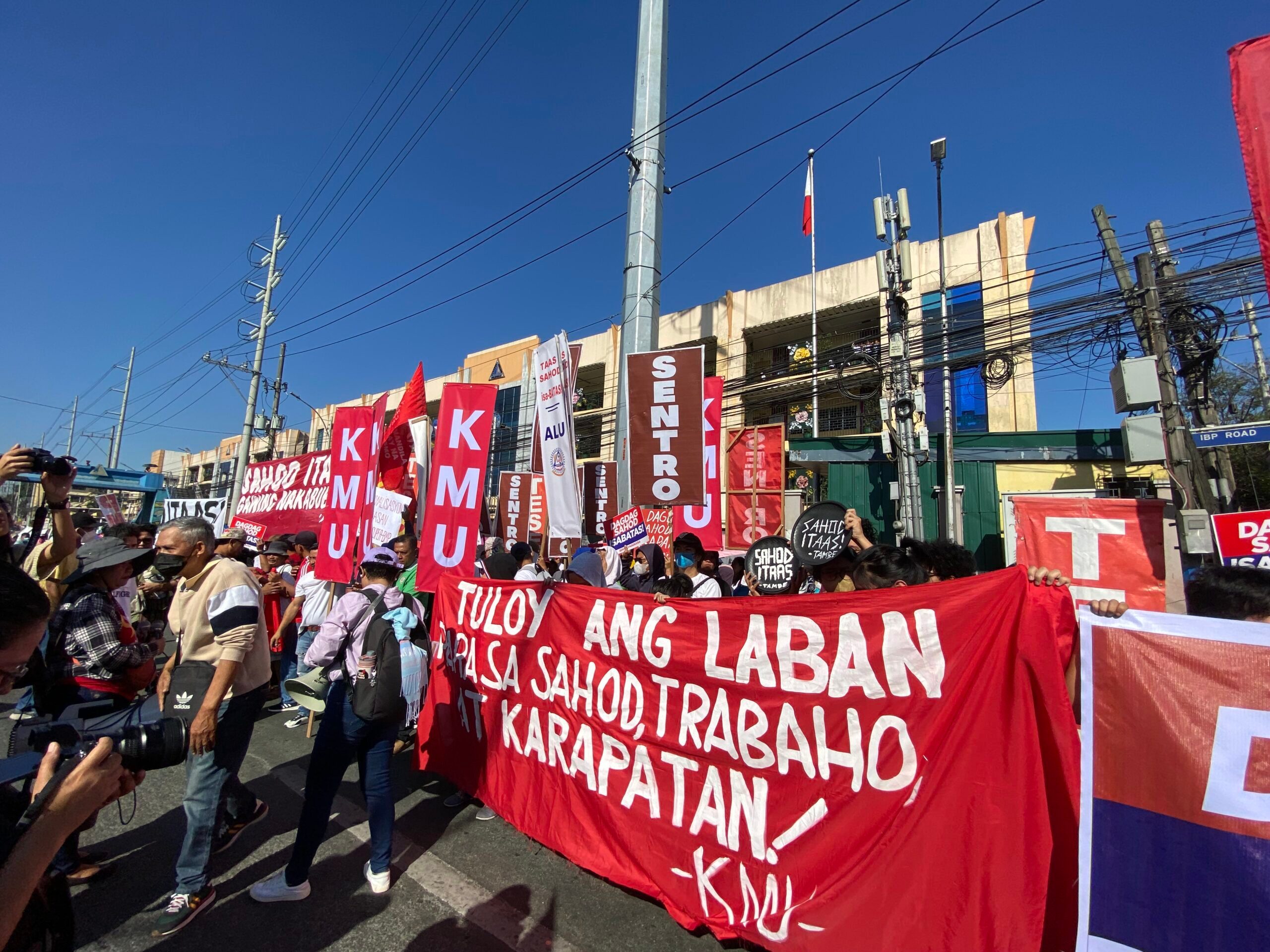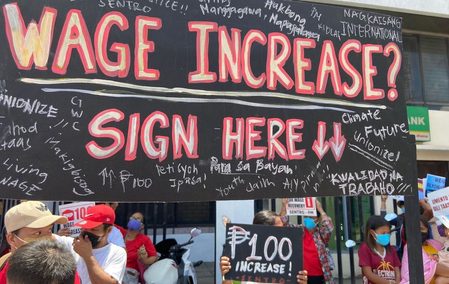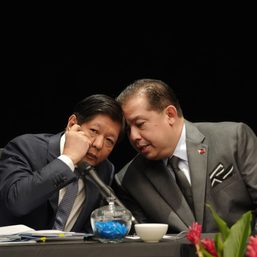SUMMARY
This is AI generated summarization, which may have errors. For context, always refer to the full article.

MANILA, Philippines – As workers and employers discussed at the House of Representatives their stands on the various bills proposing salary hikes for Filipino minimum wage earners, a common idea emerged that may work for both group: subsidies.
MANILA, Philippines – As workers and employers lay out their stands at the House of Representatives on the various bills proposing wage hikes for Filipino minimum wage earners, a common idea emerged that may work for all: subsidies, whether for employers or workers.
With the Senate passing on third and final reading a measure seeking to implement a P100 across-the-board increase for minimum wage earners, eyes are on the lower chamber to get its version of the bill moving. There are several versions filed in the House with different amounts, ranging from P150 to P750 increases. (LIST: Wage hike bills to be tackled by House)
In the House labor committee hearing on Wednesday, February 28, lawmakers took three hours to hear out the positions of labor groups, employer groups, and the academe. Workers had a common message: Filipino workers don’t earn enough, and this proposed across-the-board increase wage would give them a chance at a living wage, or a wage beyond mere survival.
Meanwhile, employer groups said they were also caught in a tight situation: an increase, even a tiny one, might cause job losses and inflation.
But one thing a lawmaker, a labor group, and an employers group agreed would help ease the burden for employers, particularly smaller businesses, are subsidies from the government. This would allow workers to have their increases, while aiding businesses that may struggle to pay them.
“We recognize the impact of mandating wage increases on micro and small businesses which is why the government must act by providing wage subsidies to ensure that their workers receive fair wages while ensuring the survival of their businesses,” said Gabriela Representative Arlene Brosas in her opening statement.
Struggle beyond wage payment
Confederation of Wearables Exporters of the Philippines executive director Maritess Agoncillo illustrated how the exporters in her group could not afford increasing wages of their workers, as current market forces already hinder their competitiveness against other Southeast Asian countries.
But without even factoring in the possible wage increase, Agoncillo said that the group projected a loss of 12% of its workforce in 2024 because of market forces, such as the lack of preferred trade agreements that other countries have, leading their buyers to migrate their orders to Vietnam, Cambodia, and Indonesia.
“So the market was soft, then you come up with a mandated wage… We had to shed off around 21,000 workers from last year,” Agoncillo told reporters in a chance interview after the hearing.
“We understand the plight of our workers, we know how inflation can hit their take-home pay, so we are requesting for… the government to provide an inflationary subsidy to the minimum wage earners,” she added.
The Sentro ng mga Nagkakaisa at Progresibong Manggagawa (Sentro) labor group also stood behind a subsidy, but for firms.
“To address concerns from employers, Sentro believes that it is necessary to provide subsidies to firms that are struggling, or would struggle to compensate workers fairly as a result of these legislative measures. Existing laws and policies already exist for this purpose. This can be expanded and refined as needed through proper consultation among the social partners,” said Sentro campaign officer Benjamin Alvero.
Alvero added that the fact that there was a need to discuss a wage hike at the level of national legislation was an “indictment” that the existing system with regional wage boards was not working.
According to Representative Brosas, subsidies, if approved, will only be feasible in 2025.
“For medium, small, and micro enterprises, we want there to be a wage subsidy for those who cannot afford it. The ones who are able able to get away with paying low, minimum wages are large companies. We should put it into that context – large companies do not want to raise wages. For what reason? We do not know, because the productivity level has risen,” she told Rappler in a mix of English and Filipino.
If the bill providing an across-the-board increase gets approved this year, Brosas said that firms cannot expect subsidies immediately, as lawmakers would have to add the funds for this in the 2025 General Appropriations Act.
Quality pay for quality workers
Mark Villena, advocacy officer of the Associated Labor Unions in the Trade Union Congress of the Philippines, noted how raising wages was for the sake of taking care of the next generation of Filipinos.
“Ang susunod na generation ng mga workers ng Pilipino, maaaring nagkukulang. Kumbaga, kung ang Pilipinas mismo ninanais nang umangat ang ekonomiya niya, kailangan niya ng quality workers. At hindi nito makukuha ang quality workers kung hindi sapat ang sustensya na nakakamit ng mga manggagawa ngayon,” Villena said in a picket along Batasan Road before the hearing.
(The next generation of Filipino workers might not be able to perform well. If the Philippines wants to develop its economy, it needs quality workers. And it will not have quality workers if workers now do not have enough to provide for their families.)
For Jerome Adonis, secretary general of Kilusang Mayo Uno, workers only sought to achieve the living wages mandated by the Constitution.
“Kami ay dumudulog sa House of Representatives ng dagdag sahod hindi para malugi ang mga kumpanya at hindi para tumaas ang presyo ng bilihin. Kami po ay nagmumula sa aming constitutional rights na magkaroon kami ng nakabubuhay na sahod, para mabuhay nang disente ‘yung aming pamilya,” he said after the hearing.
(We are here at the House of Representatives appealing for a wage hike, not because we want companies to go bankrupt or to cause the rising prices of goods, but we are coming from our constitutional right to have a living wage, so that our families can live decently.) – Rappler.com
Add a comment
How does this make you feel?






There are no comments yet. Add your comment to start the conversation.